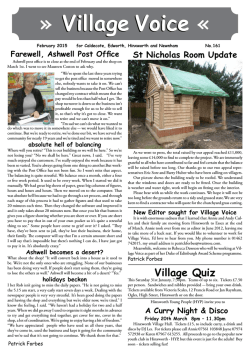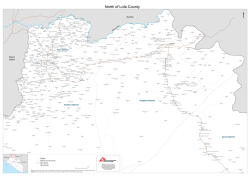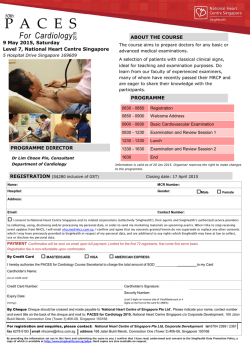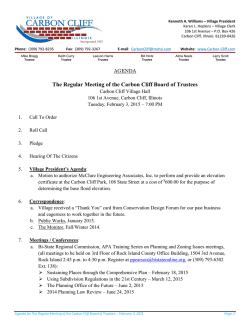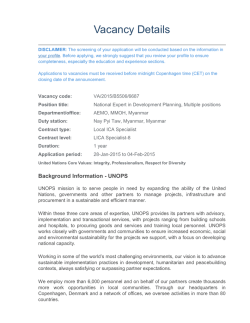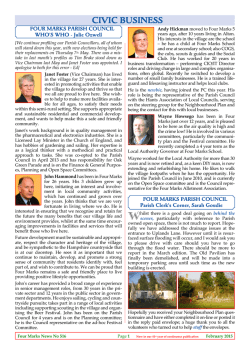
Singapore as a Digital Village a Plausible Reality Dr Carol Soon
Singapore as a Digital Village a Plausible Reality Dr Carol Soon Research Fellow, Institute of Policy Studies Village as an idea and type of abode juxtaposes sharply with the dense city landscape which Singapore embodies. The “kampung spirit” has been invoked by policymakers to remind citizens of the importance of social ties in an increasingly diverse society such as Singapore’s. In a village such as the one depicted in the figure below, people’s sense of belongingness is grounded on physical proximity and frequent interaction cultivates strong ties among villagers. There is also much vigilance as members of the community watch one another’s back and extend help when needed. Gotong royong, working together and providing mutual aid for the benefit of those living in the same community, is a distinctive feature of village life. Picture from https://earthisnotround.wordpress.com/2011/08/03/simple-village-life-and-thediscomfort/ After industrialisation, the Internet has been touted as the next major threat to community life in contemporary times. While some have raised concerns over how Internet use has led to social atomisation, others have argued that technology helps build social capital. While the jury is still out concerning the effects of technology on mankind, what is certain is that technology will continue to evolve, and so will human behaviour. Hence, how can we leverage the Internet to achieve greater good for all? The potential to do so is immense, especially in Singapore. Latest figures from IDA indicate high Internet access (87%) among households and mobile penetration (150%). Prime Minister Lee recently announced a slew of initiatives to develop Singapore into a Smart Nation, including the setting up of a Smart Nation Programme Office to help integrate technologies in order to better lives and build stronger communities. 1 All around us, we are beginning to see microcosms of a digital village. Global crowdfunding platform Kickstarter, established in 2009 in the US, brings creative projects to life by matching creators with funders. Projects range from the arts, comics, design, fashion, film to food, music and technology, such as the iPhone dock, which broke the million-dollar pledge mark in 2002 and the Academy Awardnominated documentary Incident in New Baghdad. Picture from http://www.imdb.com/title/tt1746180/ Closer to home, inspired by the concept of collaborative consumption and the sharing economy, Rent Tycoons was set up in 2011. Items and services that run the gamut of electronics and appliances, home furniture, ground transport, books and entertainment, computer and accessories, and fashion are put up for rent. Rent Tycoons offers both extrinsic and intrinsic benefits to its users. Renters save money, save space, and make informed buying decisions while owners earn additional income. The platform also minimises wastage by encouraging the sharing and reuse of items. Picture from http://www.renttycoons.com/ 2 As we envisage Singapore as a digital village, what might its characteristics be? It is undergirded by three organising principles — problem-solving, ground-up participation and self-sustaining. In rural areas, villages are formed when people band together to combat environmental, economic and social threats. Similarly, in a digital village, people leverage collective intelligence to solve problems and improve the quality of their lives. Second, a digital village involves ground-up participation. With increasing connectedness of mobile networks, whoever has access to technology will be able to contribute to the digital village. Third, a digital village will be self-sustaining and self-correcting because people recognise that their well-being is inextricably tied to that of others and will practise self-regulation to protect group interests. To explore the potentials of a digital village, the Arts, Culture and Media Research Cluster at the Institute of Policy Studies (IPS) is leading a new research project, guided by a simple question: Can Singapore be a digital village of 6.9 million and beyond? One possible application of the digital village concept is in the area of healthcare. Singapore has been identified as a “super-ageing” nation and the healthcare system will be increasingly stretched to meet the needs of the aged, sick and those in need of palliative care. A digital village will connect different stakeholders such as recipients of care, formal and informal caregivers, voluntary and non-profit organisations, and medical institutions via an open technological platform. Through technology, the exchange of resources (such as the who, what, when and where of care provision) can be conducted in real time, without intermediation. This project requires collaboration across different disciplines, and the multidisciplinary approach is illustrated by another project the cluster is involved in. IPS is part of a team comprising the Department of Communications and New Media, and School of Computing Studies (National University of Singapore) and is developing an online platform for citizens to converge and discuss population issues. Collaboration with several government agencies that provide input to the project is ongoing. Besides creating a suitable virtual platform to facilitate discussion, the study will examine the effects of deliberation on people’s attitudes towards population issues and ascertain ideal online conditions that yield optimum deliberation. 3 Government Agencies Deliberative Democracy Department of CNM, NUS School of Computing Studies, NUS Similarly, developing a digital village for healthcare requires the expertise and contributions of different sectors such as those listed in the figure below. Besides coming up with a platform which makes direct, real-time resource-sharing and problem-solving among citizens possible, the project seeks to put forth guidelines on developing infrastructural features that cultivate positive interaction norms and how best to encourage effective usage and leverage collective intelligence to proactively identify potential problems and solutions. It will also look into necessary legal frameworks that will safeguard participants from abuse and harassment. Government Agencies Legal experts A Digital Village for Healthcare Healthcare Providers from public and private sectors Media scholars Computing scientists In every society, a member’s contribution depends on the stage of life one is at. Therefore, Singapore as a digital village will involve all citizens regardless of their backgrounds because the problem that underpins the formation of a digital village is one that matters to everyone. 4
© Copyright 2026



